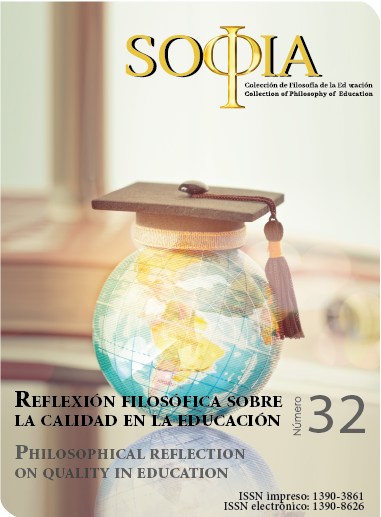Facing post-truth from a neo-aristotelian foundation of education
Main Article Content
Abstract
Article Details

This work is licensed under a Creative Commons Attribution-NonCommercial-ShareAlike 4.0 International License.
Authorship: The list of authors signing must include only those people who have contributed intellectually to the development of the work. Collaboration in the collection of data is not, by itself, a sufficient criterion of authorship. "Sophia" declines any responsibility for possible conflicts arising from the authorship of the works that are published.
Copyright: The Salesian Polytechnic University preserves the copyrights of the published articles, and favors and allows their reuse under the Creative Commons Attribution-NonCommercial-ShareAlike 3.0 Ecuador license. They may be copied, used, disseminated, transmitted and publicly displayed, provided that: i) the authorship and the original source of their publication (journal, editorial and work URL) are cited; (Ii) are not used for commercial purposes; Iii) mention the existence and specifications of this license.
References
ARISTÓTELES
Metafísica. Madrid: Gredos.
Retórica. Madrid: Gredos.
Política. Madrid: Gredos.
Ética Nicomáquea; Ética Eudemia. Madrid: Gredos.
AUBENQUE, Pierre
La prudence chez Aristote. Paris: PUF Quadrige.
BLACKBURN, Simon
On Truth. Oxford: Oxford University Press.
CAVELL, Stanley
Cities of Words. Cambridge: Harvard UP.
ESCOBAR, Andrés & RAMÍREZ, César
El diálogo filosófico como Aventura y experiencia que cura. Sophia, colección
de Filosofía de la Educación, 29, 261-285. https://doi.org/10.17163/soph.
n29.2020.09.
HABERMAS, Jürgen
Conciencia moral y acción comunicativa. Barcelona: Provenca.
HEIT, Helmut
‘There are no facts…’ Nietzsche as Predecessor of Post-Truth?” Studia Philosophica
Estonica, 11(1), 44-63. https://bit.ly/30suBiY
HOBBES, Thomas
Leviathan. New York: Penguin Classics.
KIRK, Geoffrey S. & RAVEN, John Earle
The Presocratic Philosophers. A Critical History with a Selection of Texts.
Cambridge: Cambridge UP.
LACLAU, Ernesto & MOUFFE, Chantale
Hegemonía y estrategia socialista. México: Fondo de Cultura Económica.
MACINTYRE, Alisdair
After Virtue. Indiana: University of Notre Dame Press.
MORIN, Edgar
La Méthode 6. Éthique. Paris: Seuil.
Introduction à la pensée complexe. Paris: Seuil.
MURDOCH, Iris
The Sovereignty of Good. London: Routledge.
NUSSBAUM, Martha
Upheavals of Thought. Cambridge: Cambridge UP.
NIETZSCHE, Friedrich
Segunda consideración intempestiva. Sobre la utilidad y los inconvenientes de
la Historia para la vida. Buenos Aires: Zorzal.
PLATÓN
Diálogos VI. Timeo. Madrid: Gredos.
SLOTE, Michael
Moral Sentimentalism. Oxford: Oxford UP.
SWANTON, Christine
Virtue Ethics: A Pluralistic View. Oxford: Oxford UP.
VAN ZYL, Liezl
Virtue Ethics. New York: Routledge.

